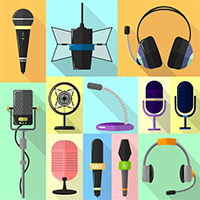If you are an author keen on taking advantage of this booming advancement in publishing, these are my 5 ways to audiobook like a boss.
Audiobooks are the fastest-growing sector of the entire publishing industry. Statistics put forth by the Association of American Publishers show ebook sales down 19.2% and audiobook downloads up by 31.1% from 2015 to 2016. One factor that contributes to this exponential increase in audiobook readership is accessibility—audiobooks are now available through our phones, laptops, and tablets. There's no barrier to where and when we can listen.
As a result, more and more non-fiction authors are recognizing the incredible potential audiobooks offer their business. Eager entrepreneurs, however, may dive in headfirst without giving sufficient forethought into how this unique tool can best be leveraged.
As a nonfiction audiobook publishing specialist, I see critical mistakes and bottom-line opportunities overlooked time and again. If you are an author keen on taking advantage of this booming advancement in publishing—and you have every reason to be—pay attention to these five factors that will bring your audiobook skill level from beginner to boss.
1. Don’t Voice Your Own Book (unless…)
One of the most frequently asked questions I receive is, “Should I narrate my own book, or work with a narrator?” That is the wrong question to ask. What you really want answered is the question, “Is there any advantage to narrating the book myself?” Most often, the answer is no. Here’s why:
Audiobook Creation Exchange (ACX) reports that it takes an average of 6.2 hours of production time for a professional narrator and editor to create one hour of finished audio. That means that an average non-fiction book of 60,000 words requires twenty-five to thirty hours of production time—for an experienced professional. Even if you’re an experienced public speaker or podcaster, the skill set for audiobook narration is distinct. In addition to specialized voice training and having to learn microphone and breathing technique, consider the time and expense for a home recording studio setup or rental time in a recording studio. All in all, you can reasonably expect to triple your time investment or more.
Instead, your audiobook could be professionally produced at a reasonable cost and delivered to the world with ease in about 6 weeks. You could be reaping the benefits and leveraging this asset like a boss, rather than spending your time and money going through a learning curve you simply don’t need to go through.
There is however, an exception to this rule. If you have a following in the millions who is used to you speaking on stages, on TED talks or in other audio recordings—and you have built your platform and reputation around your unique voice and speaking qualities—then you may be a good candidate to voice your own audiobooks. Otherwise, ditch the temptation to try to save money—because you won’t.
2. Know Your Rights
Don’t fall prey to the amateur mistake of not knowing your audio rights. It is imperative that you understand the legalities of audiobook production, so that you can protect your intellectual and financial investments.
If you're planning to work with a publisher, this information is absolute gold for you as you negotiate your contract. Many authors sign their audio rights away without even knowing it—they find out after the fact that an audiobook version of their print book has been created, and worse yet, they won’t receive reasonable royalties for the sales of that audiobook. With the rise in audiobook popularity, lack of attention to this detail can add up to substantial financial loss.
3. Collect Bounties
Audible, Amazon, and iTunes have a common back end for self-published authors to produce audiobooks. It’s called ACX.com (Audiobook Creation Exchange). If you hold the rights to your audiobook and distribute your audiobook through ACX.com, you are eligible to earn bounties.
A bounty is an additional type of earning paid to you when your book is the first purchase of a new Audible member. For each bounty earned, you receive $50.
Unfortunately, ACX is only available if you live in the U.S. or U.K., but a good audiobook publisher can help you take advantage of this opportunity as well as self-publishing royalty rates, adding significant income to your bottom line.
4. Leverage Your Launch
There are two “right” ways to launch an audiobook. In one scenario, your previously launched print or digital book is given new life by being turned into an audiobook format.
This strategy gives you the ability to have an entirely new product launch without having to create any new content. If your content needs a little updating, then pairing an “anniversary edition” or “second edition” of your book with an audiobook version is a fantastic option.
Second, if you’re in the process of getting ready to publish a new book, having an audiobook version will extend the life of your launch. To have a powerful launch, you want to reach as many people for as long as possible. Releasing your audiobook two to twelve weeks following your initial book release allows you to keep the momentum and excitement going—with minimal changes to your social media and email content.
5. Build a Podcast Tour
In today’s high-tech publishing world, it’s no secret that in-person book tours are not a cost or time-effective means to connecting with your market. Blog book tours have been an alternative practice for several years now, but a lesser-known opportunity exists via podcast tours.
A podcast is a downloadable, online radio show—a thriving platform for effectively broadcasting your brand. There are now nearly 60 million people in the U.S. alone listening to podcasts every month; this presents a giant opportunity for you to engage with potential readers—if they listen to podcasts, they likely also listen to audiobooks.
Connect with the hosts of podcast shows that intersect with your target market, and arrange to be a guest expert on their shows. Conduct a book reading, answer insider questions about the subject matter, and share how listeners can access further information about your title and services.
To really be a boss, send a short clip of your audiobook to the podcast host in advance of your interview, and invite them to post the clip along with their Amazon affiliate link to your book and audiobook. The host can also include this link in his or her website copy (or “show notes,” as they are known in podcasting) for your podcast episode. This strategy creates more rich content for the host, and an opportunity for both you and the host to benefit financially.
Work with the podcast host to have the show published during your initial launch window, and boom—you’ve successfully leveraged your audiobook to drive sales and initial rankings far beyond the level of a mere beginner.
Would you like to listen in on some of our audiobooks?

Create a Professional and Profitable Audiobook!
The Insiders Guide to Audiobook Production gives you the inside track to create a high-quality and effective audiobook and reach a much larger new audience.
Thank you!
Please check your inbox for your email.
If you don't see anything in a few minutes, please check your spam folder.

